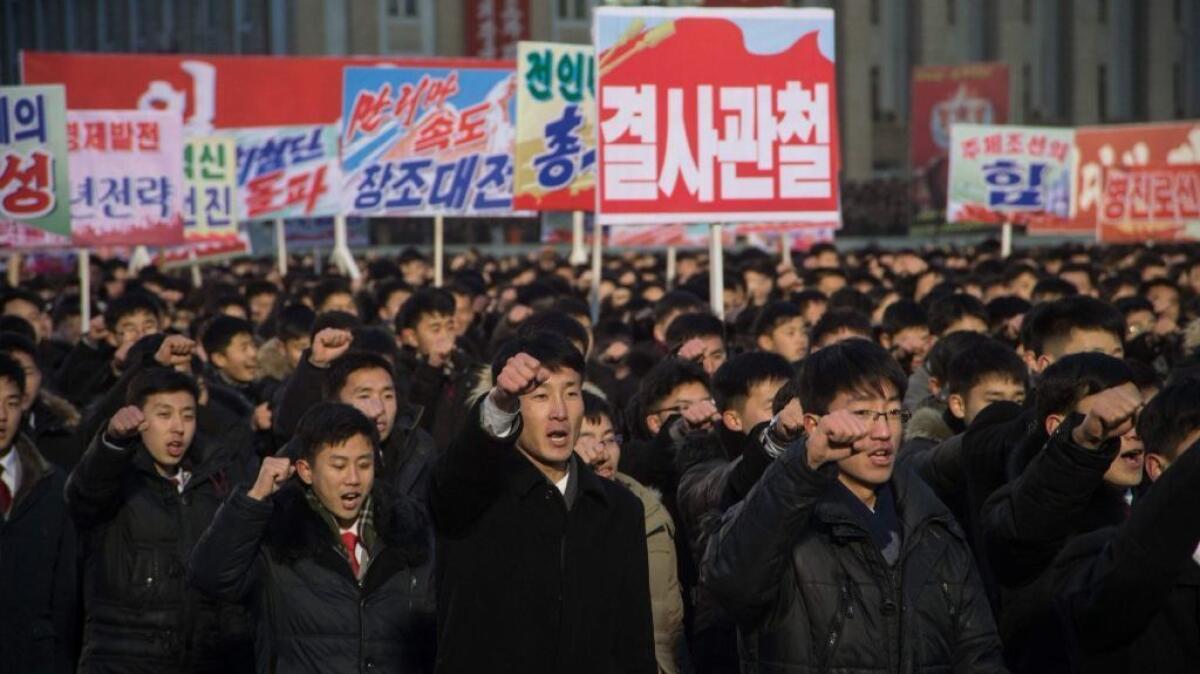Trump agrees to delay U.S.-South Korean military exercises to ease tensions with North Korea

- Share via
Reporting from Washington — Two days after he taunted North Korea about his “nuclear button,” President Trump indicated Thursday he would postpone long-planned joint U.S. military exercises with South Korean forces to ease tensions on the Korean peninsula during the Winter Olympics.
Trump told South Korean President Moon Jae-in in a phone conversation that he would agree to “de-conflict the Olympics and our military exercises” so both nations “focus on ensuring the security of the Games,” the White House said in a statement.
The Olympics torch lighting ceremony is on Feb. 9 in the South Korean town of PyeongChang, about 60 miles south of the world’s most heavily armed border, and the Games will run until Feb. 25.
Moon had requested the delay last month and Trump’s belated agreement came as Seoul and Pyongyang reestablished an emergency hotline on the border and moved to start bilateral talks there on Jan. 9, a nascent thaw that largely left the United States on the sidelines.
The White House statement did not specifically say the annual exercises, called Foal Eagle, would be postponed. But a Pentagon spokesman said they were being pushed back until after the Olympics end, although he did not give a date.
About 17,000 American and more than 300,000 South Korean troops participated in the 2017 exercises, which included drills to preemptively “detect, defend, disrupt and destroy” North Korean nuclear and missile facilities.
North Korea views the annual exercises as pretext for an invasion from the South. The two heavily armed nations have had endured an uneasy peace since an armistice ended the Korean War in 1953.
China, Russia and other world powers long have proposed a so-called freeze-for-a-freeze as the basis for reviving nuclear disarmament talks with the North. That would require the United States to suspend military exercises in South Korea in exchange for North Korea suspending further nuclear and ballistic missile tests.
Successive U.S. administrations have strenuously rejected that linkage, saying U.S. military operations on the peninsula are defensive in nature, and thus legal under international law, while Pyongyang’s nuclear tests are in violation of multiple United Nations resolutions.
On Wednesday, North and South Korea reopened a hot phone link at the truce village of Panmunjom, which sits on the border. Liaison officials from the two governments spoke for about 20 minutes, exchanging names and technical information, Seoul’s Unification Ministry said.
While the United Nations hailed the apparent de-escalation, the White House has eyed the contact warily, worried it might be left out of talks in which Moon would offer overly generous concessions to North Korean leader Kim Jong Un.
On Tuesday, Trump responded to Kim’s claim that he had a “nuclear button” on his desk by tweeting back that his nuclear button “is much bigger and more powerful.”
The tweet was so unusual that two Democrats on the Senate Intelligence Committee, Sens. Martin Heinrich of New Mexico and Ron Wyden of Oregon, asked Director of National Intelligence Dan Coats to conduct a formal intelligence assessment of the risk it posed to U.S. interests and personnel.
In a letter, the two said the assessment should include Trump’s “other threatening tweets and statements, and whether this rhetoric serves as a deterrent or a provocation.” Coats’ office did not immediately respond.
On Thursday, however, Trump sought to claim credit for the potential North-South rapprochement by suggesting his tough talk had brought the two sides together.
“With all of the failed ‘experts’ weighing in, does anybody really believe that talks and dialogue would be going on between North and South Korea right now if I wasn’t firm, strong and willing to commit our total ‘might’ against the North,” Trump tweeted. “Fools, but talks are a good thing!”
The talks are likely to produce North Korean participation in the Olympics and a temporary period of eased tensions, but not necessarily a longer-term breakthrough, especially on the nuclear impasse, analysts said.
Kim is likely to seek additional concessions, such as further delay in the joint military exercises and an easing of economic sanctions, but Washington is unlikely to agree, said Scott A. Snyder, a Korea expert at the non-partisan Council on Foreign Relations.
“A temporary pause is welcome,” Snyder said. “South Korea would like lasting change in the trajectory, and will work hard for that, but it’s probably not possible” given the war of words between Trump and Kim.
The developments began this week when Kim, in a New Year’s Day address, declared his nuclear arsenal capable of reaching all of the United States, and offered an olive branch to South Korea by suggesting he might send a delegation to the Olympics.
Moon’s government quickly reciprocated, calling for high-level talks to discuss the Olympics and other “inter-Korean” issues.
In their conversation Thursday, Trump assured Moon that the United States would send “a high-level delegation” to the Olympics, the White House said. Nikki Haley, the U.S. ambassador to the U.N., recently suggested that the United States might not participate if it thought American athletes would be in danger.
For more on international affairs, follow @TracyKWilkinson on Twitter
More to Read
Sign up for Essential California
The most important California stories and recommendations in your inbox every morning.
You may occasionally receive promotional content from the Los Angeles Times.













